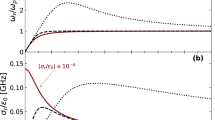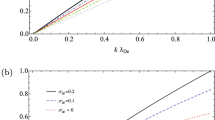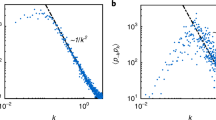Abstract
IN his studies of cosmical electrodynamics, Alfvén1 has demonstrated the existence of magneto-hydrodynamic waves in an ionized gas situated in a magnetic field. They are transverse waves and are propagated only in the direction of the magnetic field. Their velocity is H (4πµ)−½, where H is the magnetic field and µ is the mass density. The mass velocity of the gas is equal to the varying transverse part of the magnetic field divided by √(47πµ).
This is a preview of subscription content, access via your institution
Access options
Subscribe to this journal
Receive 51 print issues and online access
$199.00 per year
only $3.90 per issue
Buy this article
- Purchase on Springer Link
- Instant access to full article PDF
Prices may be subject to local taxes which are calculated during checkout
Similar content being viewed by others
References
Alfvén, H., “Cosmical Electrodynamics”, chapter 4 (Oxford University Press, 1950).
Bailey, V. A., Aust. J. Sci. Res., A, 1, 351 (1948).
Åström, E., Nature, 165, 1019 (1950).
Herlofson, N., Nature, 165, 1020 (1950).
Author information
Authors and Affiliations
Rights and permissions
About this article
Cite this article
DUNGEY, J. Derivation of the Dispersion Equation for Alfvén's Magneto-Hydrodynamic Waves from Bailey's Electromagneto-Ionic Theory. Nature 167, 1029–1030 (1951). https://doi.org/10.1038/1671029a0
Issue Date:
DOI: https://doi.org/10.1038/1671029a0
Comments
By submitting a comment you agree to abide by our Terms and Community Guidelines. If you find something abusive or that does not comply with our terms or guidelines please flag it as inappropriate.



